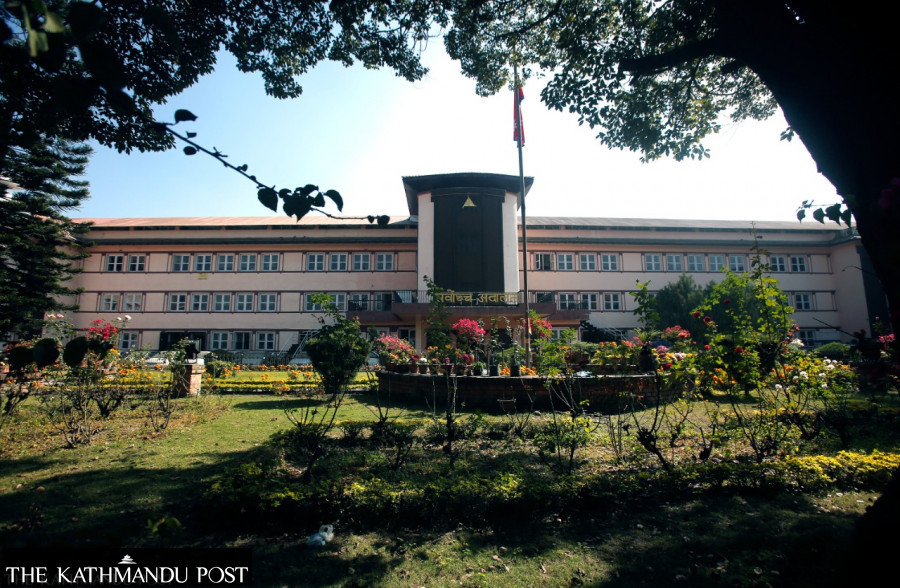National
No interim order in cases of constitutional body appointments
Appointees from the time of Oli government can continue their work pending final hearing.
Tika R Pradhan
The Supreme Court on Wednesday refused to issue an interim order against 52 officials appointed to various constitutional bodies.
With this development the officials can now continue their duties unhindered until the final verdict in the case.
The Constitutional Bench has instead issued a show cause notice to the defendants including the Office of the Prime Minister and Council of Ministers, the President’s Office, chairperson of the Constitutional Council, and the chief justice.
Responding to the petitions filed by advocates Dinesh Tripathi, Om Prakash Aryal and Smriti Kharel, among others, demanding that the appointments at various constitutional bodies be scrapped, the bench led by acting Chief Justice Deepak Kumar Karki said that an interim order was not needed because it has already been more than a year since the appointments were made and that they have already been discharging their duties.
“It would be better to address all the issues together from the final hearing,” the bench observed. “Citing the seriousness of the subject, priority is given to its hearing.”
The Constitutional Bench has also ordered the defendants to furnish all the decisions related to the appointments of the 52 office bearers in the constitutional bodies.
It has also ordered the court administration to present three other petitions related to the constitutional appointments together after the written response arrives from the defendants.
The Constitutional Council had recommended 52 individuals for appointment to various constitutional bodies on December 15, 2020 and May 9, 2021 when CPN-UML chair KP Sharma Oli was prime minister. Oli at that time was the chair of the Nepal Communist Party (NCP) as well, which was invalidated by the Supreme Court on March 7 last year.
The appointments had run into controversy as the then Oli government had amended the Constitutional Council (Functions, duties, powers and procedures) Act-2010 through an ordinance to make it easier for convening the meeting of the Constitutional Council in the absence of the Speaker and the leader of the main opposition (the Nepali Congress at that time).
The petitions, however, were pending at the court, as questions had arisen if Chief Justice Cholendra Shumsher Rana could lead the Constitutional Bench, given a conflict of interest. As chief justice, Rana was a member of the Constitutional Council that made the recommendations.
Since Oli had dissolved the House on December 20, 2020 and then again on May 21, 2021, all the nominees were appointed by the President without their parliamentary hearing.
Hearing on the petitions began on Friday, days after an impeachment motion was filed against Rana, who now remains suspended.
The Karki-led Constitutional Bench that issued the show cause notice on Wednesday had justices Mira Khadka, Hari Krishna Kari, Bishwambhar Prasad Shrestha and Ishwar Prasad Khatiwada as members.
With the bench’s refusal to issue an interim order, apprehensions that the local elections could be affected have been cleared.
There were some concerns, including from UML chair Oli, that elections could be affected if the court issued an interim order against the appointments.
Of the 52 appointments made, two were for the Election Commission—Ram Prasad Bhandari and Janaki Kumari Tuladhar as election commissioners. Local polls have been scheduled for May 13.
The petitioners had demanded that the appointments to constitutional bodies by the KP Sharma Oli government after amending the concerned law through an ordinance should be scrapped and that an interim order to restrict the appointees from continuing their duties be issued until a final hearing.
With the court refusing to issue an interim order, all the appointees can now continue their work in their respective positions.
“We had demanded that the court issue an interim order to stop those appointed unconstitutionally from discharging their duties, but that demand was rejected,” said advocate Aryal, one of the petitioners. “[But]… It doesn’t mean that the court has rejected all our demands. The final hearing will be held after receiving clarifications from the defendants in writing.”
Another petitioner Tripathi, however, said the court should have fixed a certain date for the next hearing.
“I don’t think the court will accept the constitutional appointments though it has refused to give an interim order to stop their activities immediately,” Tripathi, a senior advocate, said. “If the court accepts the unconstitutional appointments, it will be another regressive move.”
The petitioners had demanded that the court quash the ordinance brought by the Oli government to amend the Constitutional Council (Functions, duties, powers and procedures) Act-2010 besides issuing an interim order to halt all the activities of the 52 officials who were appointed without parliamentary hearing.
The Oli government that issued the ordinance, however, fell on July 13 last year after the Supreme Court ordered appointment of Nepali Congress President Sher Bahadur Deuba as prime minister.
On July 18 last year, the Deuba government scrapped the ordinance to amend the Constitutional Council (Function, Duties, Power and Procedure) Act-2010 brought by the previous government, just before the first meeting of the reinstated House of Representatives.
During the hearing on Wednesday, lawyers had demanded that the court must issue an interim order to stop office bearers of the various constitutional bodies appointed through the ordinance from working.
“The court’s refusal to issue an interim order to stop the 52 officials from discharging their duty does not mean that the court will approve their appointments,” said Balaram KC, a former Supreme Court justice. “It will give a final verdict after studying all the documents and responses of the defendants.”




 10.12°C Kathmandu
10.12°C Kathmandu















